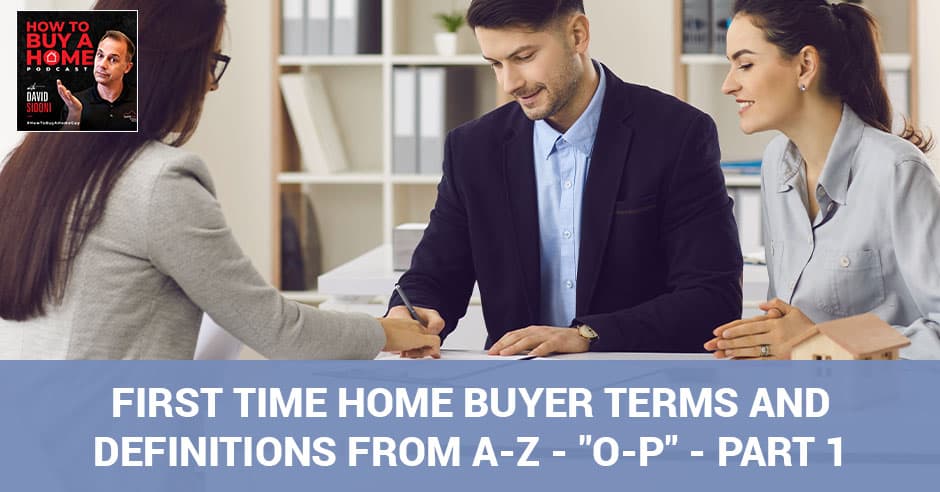
A continuation of the glossary of terms you need to know when buying a house. The next stop is O and P. Know your PUDs from your PMIs. David Sidoni uses real-life layman’s terms and definitions so you don’t feel overwhelmed and clueless with all the real estate jargon. Plus a very special SIDE NOTE to help you learn even more about the first-time home buying process.
—
First Time Home Buyer Terms And Definitions From A-Z – “O-P” – Part 1
A Glossary Of All The Terms You Need To Know To Buy Your First Home
Welcome back to another edition of the Term and Definitions Series. This episode’s letters are O and P. I love the letter P because many of my favorite first-time home buyer words are P words. You got Patience, Persistence, Perseverance, Positive attitude and the one P word that I positively preach persistently is Planning. I did all the googling for you so you don’t have to. It’s time for the layman’s glossary. Plus, you’re going to get a bonus side note. Let’s go.
—
Why are you starting a show at O and P, 2/3 of the way through the alphabet? It’s right there in the title. That’s what we’re doing. Scroll back to episode A. Go in order. To start, you got to know that when it comes to O, there’s only one word that you need to know. This episode is going to be one O word then it’s going to be all about the P. We’re also going to be going into a very important side note tangent. It’s about the questions that you want to ask when you’re buying a home. What do you ask? To whom do you ask it and when? This will help you make sure that you’re going to be getting the best answers to help you make the best decisions moving forward.
The One “O” Word Options
When it comes to our O word, this is one that you’re not going to find on Google when you look for the real estate terms from A to Z. Technically, this is not a technical real estate term but if read this any time, you’ll understand that it’s one of the most important words, Options. Some of you come here for the specifics and the details. When I talk about options, it’s going to sound like I’m talking a little bit about philosophy and theory in buying a home.
Options are huge. If you’re an analytical type, a spreadsheet person, an engineer, a number cruncher or someone who loves to be prepared so you can look at everything from every angle to make sure that you make all the right moves, you understand the best way to be able to make the right move is to be able to have all the different options. If you’ve only got 1 or 2 options, that limits you being able to get to the best outcome as opposed to if you had 5, 6, 7, 8 or 9 different ways to get there.
Let me give you the best advice that I can give. Your perfect home-buying formula can be improved more with actions than it can research. That’s going to freak some of you out. Some of you love to do all the research. Let me explain to you. I’m telling you this because I want you to win. The biggest winners are not the ones who try to create the fastest linear path after they do all their research, trying to find the most efficient way to complete the mission.
[bctt tweet=”Your perfect home buying formula can be improved more today with actions than it can with research.” via=”no”]
I know this is going to drive some of the annual planners crazy but creative options and taking action to find out what those options are and realizing which ones you can use is the formula to create the biggest winners. The bottom line is if you take those actions and figure out all those different paths, you can still go down the simple linear path if you choose to. The more planning that you do, the more options that you’re going to get. The way to do that is by starting with a trusted team early to help them enlighten you along the way so that you can be creative and eventually have multiple different choices to help you with everything.

I’m talking about your loan approvals, loan product options, tax return changes, savings plans, credit score help, down payment options, employment verification, neighborhood choices, the layout of the house that you’re looking at, the potential long-term sale of the home or rental options, your negotiation strategies, seller credit options and ultimately, figuring out the best way to set you up for the most favorable offering terms architecture that’s going to help you land the home that you truly love.
Two words that encapsulate the first-time home-buying process are options and compromise. The more options you have, the less compromise you have to do. You compromise for the greater good. The earlier and the more thoroughly you plan, the more options you’re going to have and the less that you’re going to have to compromise. Get your realtor and lender guides and start early because some of these items take a lot of time to get done for you to have the potential to use the best options, whether it’s a credit or saving or getting all your ducks in a row.
Once you have that all complete, then you can work the system so when the day comes that you are ready to start writing offers, you have multiple different options, arrows in your quiver and snowballs to throw in the snowball fight as the little kid did with Will Ferrell when he was the elf. He had tons of snowballs to throw. You know who was going to win that fight. The more options that you have, the less chance that you have to settle. That’s our exciting O word.
Partial Payment, Payoff Amount, Payment Change Date, & Payment Cap
Let’s go to P. Our first P is Partial payment. That’s where we’re going to start. I understand it’s alliteration and it sounds cool but nobody knows. I will define partial payment. Maybe you’re an ambitious 16-year-old preparing to buy a home when you’re 18 so I’m going to explain this seemingly self-explanatory term. A partial payment is a payment that is less than the scheduled monthly payment. If you do that on a mortgage loan, depending on how hardcore your bank is, sometimes it’s not going to count and you might end up getting a 30-day ding on your credit so make sure you check with them.
Our next P is the Payoff amount. This is probably something you’re not going to need to worry about if you are a buyer but when you sell a home, your payoff amount is how much you will have to pay to satisfy all the terms of paying off your mortgage and any fees or anything you have left over. The Payment change date is another important one for those ARMs that we talked about in other episodes. Adjustable-rate mortgages are something that is starting to come back and people are starting to use them. You have to understand your payment change date. That is the date when the new monthly payment amount takes effect.
It’s something that screwed up a whole bunch of people in the past when they got hit with a change date they weren’t ready for or a balloon payment. It’s something you got to understand. This is super important for you to know. I would put a reminder in your calendar 6 months or 1 year ahead of time if you do have a payment change date coming with your ARM so your mortgage doesn’t unexpectedly go up hundreds of dollars and you don’t find out until they take the money out of your account. Our next P is the Payment cap. This is another term that’s mostly used for adjustable-rate mortgages or other variable-rate loans.
[bctt tweet=”Put a reminder in your calendar a year ahead of time if you have a payment change date coming.” via=”no”]
For some of you, the payment cap could be the reason why using that ARM, Adjustable-Rate Mortgage, might be a smart decision for you. It’s obvious it’s a cap. What that means is it’s going to limit the amount that payments can’t increase or decrease. You got to think about the cap on the top but also the bottom. They come at different times within the period of your loan. They’re going to give you a simple formula that will be a plus minus, which means in your advanced loan program planning that you’re doing when you’re working with your ARM, you’re going to know at this date it can only go upper minus this much.
Side Note: Asking Questions
The good thing about that is it can’t jump up or drop down, which we’d love it to do but they’re going to take care of themselves too. You’re also protected. It can’t jump way up if rates go nuts. Keep in mind, this does not limit the amount of interest the lender is earning. Had none of that made any sense to you, then I would say don’t get an ARM just because Uncle Joe told you to. Find yourself a unicorn team. Have them work with you. Do hours and hours of digging with you on your finances and personal goals and then they could help advise you, which leads me to this episode’s bonus side note.
This is a side note I’ve been waiting to talk to you about for a long time. It’s an overall practical how-to about the entire first-time home buyer process, mostly talking about how you ask the questions, whom you ask them to, when you ask them or what you ask. That sounds like a lot to cover in a side note but it’s pretty simple. I’m going to break this down for you because I want you to make sure when you ask the questions, you know what answers to expect that is going to be the best for you. First of all, I do encourage you to go ahead and ask me all the questions that you want. Go for it. Bring them on. I’ll do my best to answer them.
It’s right there on my website, HowToBuyAHome.com. There’s a freaking ask a question and Ask David button. I’m down with that. This is my jam. Let me make sure that I clarify something with this side note. Many questions have come to me from readers all over the United States and Canada. People are asking me questions all the time. There are many that I cannot in good conscience answer with only partial information.
This is the big one I want you to understand. I want you to ask all your questions but I do also want you to make sure that I believe that nobody with any integrity should see 1 sentence, 1 paragraph or even a 1-page question from someone who’s going to make the biggest financial decision of their life, turn around and advise them one way or the other with a blanket statement. This is not one size fits all. This is not everybody gets the same thing off the shelf. This is individually, uniquely personal.
As much as I’d love to be able to help you out, there are a few questions that you can ask that could be or should be given a quick answer by any real estate professional who doesn’t know your full story. Do you know why? It’s because there are too many options. There’s the option word again. Let me give you some examples of questions that have been asked to me that I was not able to answer and send a 1 word, 1 paragraph or 1 quick answer to because I didn’t have all the information. I couldn’t answer with any ethical integrity to make sure that I was leading them in the right direction.
“David, with the market changing, should I look into an ARM instead of a fixed?” “David, we can go 10% or 20% down. Which one should we do?” “David, I just found your show. It’s great. I’m excited. We found this home,” and then they send a link to the home on Zillow. “Do you think this is overpriced? Should we go for it? What should we offer?” Those are a few examples. Thank you so much for reaching out to me. At least I’m getting through to somebody out there who thinks that maybe I know what I’m talking about. Maybe I can help you because all I want to do is make sure that you thrive.
It’s not your fault for reaching out to me, asking these questions and looking for an expert opinion. I am telling you I’m not going to be able to give it to you. I shouldn’t, I can’t and I won’t answer a short question with a definitive answer to make me sound like I’m the guy who knows everything and I could do everything right. I don’t know you. I don’t know your situation. There are way too many variables. I’m extremely flattered that you think I might have the right answer but the real right answer is that no one should ever answer these all-encompassing giant questions like they’re a salesperson at Best Buy comparing two different computers for you who goes, “If I were you, you got to buy this one. That’s a killer deal.” I wish I could do that but I can’t.
I get it. You just want answers. It’s confusing and you want guidance or maybe you don’t want to be spammed, hassled or sold to. You’re probably super wary of engaging with the pariah on the internet who is trying to capture you as a sale. It’s a high-pressure spam a lot world of online real estate. If you’ve ever asked anybody on Zillow or Redfin for a little question, “This house looks interesting. What’s the square footage on it,” the next thing you know, you got thirsty salespeople killing and blowing up your email and phone all day long.
I’d love to help you out and answer your questions but the key is to make sure that you understand this is why our relationship has been one way first. I got almost a million people to read this and I could tell you I haven’t talked to all of you. Most of you are just reading. That’s awesome. That’s the relationship. I give it away to you and you find the answers. I spit in the mic, drop all my knowledge and post on my Instagram, TikTok and YouTube. What’s up my peeps? How are you doing?
You watch, learn, get empowered and educate yourself. Thank you so much for asking your questions but I want to make sure that you understand that the answers that you seek are probably 1 of the 136 educational episodes that I publish somewhere online. To get the correct and specific answers for you to be answered with certainty that someone is giving you the advice directly for you and your situation, that’s going to take a pro digging deep into all the logistics.
They’ve got to get deep into your finances, debt, income, current rent, income potential, credit and savings. They’ve then got to get deep into the emotional side of things to understand what work-life balance is and the balance of how much you want to spend versus how much you want to be stable and how much you want to be comfortable. They need to understand your goals, timeframes, life situations, family situations and potential employment opportunities or maybe you’re going to want to quit and travel the world.
They need to understand your hopes and dreams. This isn’t a car that’s going to be a one-time thing that’s in and out of your life. This is your home. That’s a big emotional deal as much as it’s a big financial transaction. Don’t expect me to answer with, “Yes, this is always the thing that you should do. This is the best practice.” That’s not going to be the answer to a lot of the questions that you bring in. I’m not selling. I’m educating and starting a revolution to help eliminate the sellers and rise the education of realtors and lenders out there so that you can get to your best happy ending.

On the flip side of that, some questions do have some quick definitive answers. Let me give you examples of those. “Do I need 20% down?” No. “Can I use an adjustable-rate mortgage?” Yes. Should you do either one of those? That’s the one where it takes getting to know all the information. There are some other simple questions that I have answers for.
If someone says to me, “I don’t want to buy a home for six months. Should I wait now or should I start planning?” No, don’t wait. Start planning now. I recommend that you start planning twelve months ahead of time if you can. Another one I could answer was, “Should I use an online lender for a better rate?” No, it’s going to cost you more for their lack of customer service and presentation. You probably have a whole bunch of more cost-effective options for you. They suck.
The question I can always answer quickly is, “Is Dave Ramsey always right?” I don’t think so. He cost first-time home buyers hundreds of thousands of dollars in the last decades. He’s mean too. Finally, the one question I can answer every time without having to go deep into your personal life is, “Will I stop with the dad jokes and musical theater references?” No, that’s the price that you pay for the one experienced voice in the cluttered world of bad advice for real estate. You got to deal with that. Nothing good comes without sacrifice.
[bctt tweet=”Is Dave Ramsey always right? No. He cost first-time home buyers hundreds of thousands of dollars in the last decade.” via=”no”]
PCS Order
If you’ve got a question, pause, go to HowToBuyAHome.com and ask a question or ask David. The answer could be as simple as going to Episode 22, Episode 56 or Episode 112. It could be this is one of those I can answer quickly. Here’s the backup information on that. Check out Episode 48, Episode 63 or Episode 82. Our next P that I’ve got is for all my military people. It’s PCS orders. This makes sense for a lot of people who think they might be moving quickly because a PCS order means an active duty or service member get PCS orders. It’s a Permanent Change of Station for us civilians. That means you got to move. The official relocation of a service member and a family member living with them due to a different duty location is their PCS.
This is your life, military folks. You knew that moving was likely going to be part of what you signed up for. The good news is you’re probably going to get either potentially a housing stipend or barracks options. While the market’s changing or you’re moving all over the country, maybe look to take advantage. Episode 98 tells my story of how I could have made tons of money when I was younger if I’d bought my first home in 1991 right before the market went down. Yes, I would’ve made money if I purchased a home when the market was dropping. It’s all there in Episode 98.
It seems weird but in hindsight, now that I understand what I could have done and how to do the math, it still would’ve been better if I bought in a declining market. If you’re enlisted and you expect a PCS over the next years, there are a ton of strategies that can help you become wealthy by using your military income that you get to buy homes in the cities where you’re stationed. In ten years, who knows, maybe you’re in your 2 or 3 homes in all the different places that you’ve been stationed.
Personal Property
If you have a specific question about that, there’s someplace you can go. HowToBuyAHome.com/Ask-David. Next up is Personal property. Personal property is a technical real estate term that they use. What it means is the stuff that’s in the house, the stuff that’s not screwed into the walls. This does vary from state to state. There’s some weird law in Texas that personal property is anything that can’t be removed from a wall with a screw or something like that. The inspectors will take a screwdriver in. If you can remove it with a screwdriver, then that’s personal property. If it takes more than a screwdriver, then that’s part of the house. Pretty weird. It’s a technical term.

You’re going to hear real property and personal property. Real property is the walls of the house and all the stuff that’s attached to it. Personal property is all the stuff inside. You have to be careful when you’re using a loan because if you include too much personal property, you’re changing the value of the house based on the grand piano or the Bentley that’s in the garage. You can’t do that and get a home loan for it. It doesn’t work like that.
PITI
Our next P word is PITI. This is one that you’re going to hear a lot. It’s the four primary components of a monthly mortgage. I talk about it a billion times. PITI, Principle, Interest, Taxes and Insurance. I pity the fool who doesn’t know that acronym. You should drink for that. I’m not even going to say old. The fact that I said that comment proves how old I am. That’s Mr. T from the ‘80s. It was a great show. You should watch A-Team. It was dope. I love it when a plan comes together. Google Mr. T. He still has a ridiculous haircut from the ‘80s. It’s awesome.
PITI is the new number that you’re going to need to budget for. This is going to be the monthly number that replaces your rent payment. A small side note on this one, the TI in PITI, your Taxes and Insurance, can be paid two different ways. They can either be paid as part of your PITI. To do that, you have to do something that’s called impounding them. If your taxes and insurance are impounded, your lender takes care of it for you or you can decide you’re going to do it on your own and pay it every six months or every year depending on what’s going on in your state but you have to make sure you save up for it. You have a lower payment every month but you should be putting money away into a savings account so it can go either way.
PITI reserves. Sometimes when you buy a home to get a better mortgage interest rate or a loan product, you might have to have some money stashed away. A lot of times, you’ll hear people say, “I couldn’t get a loan until I had money that was being seasoned.” That means you have to have the money in the account for 3 months or 6 months before you get your loan approval. Having reserves means that at the time that you purchase the home, they want to see six months of PITI, your entire monthly payment, in your bank account. Check with your lender to see if you need reserves to get your loan approved.
Planned Unit Development
I love the next one. The next P is PUD. It’s a Planned Unit Development. This is not something you need to know right away to run out and buy a house but it’s something that you should be aware of. PUD is a real estate project in which individuals hold title to a residential lot and a home. That means that you own the home but some common features are maintained by a homeowner association but it isn’t necessarily categorized as a condo because it’s a PUD. It could be different in other parts of the country depending on where you are. Check with your realtor.
The reason that’s important to use is sometimes condos have different loan products. You might be able to get a better rate if you’re in a planned unit development than if you’re just a straight condo. Check with your lender. Our next P is PMI. What can I say about PMI that I haven’t already said in a million other episodes? If you want to know about PMI, go to Episode 131, Episode 69 and get all the math and the dirty details on how PMI is not the devil.

PMI used correctly is a brilliant tool to help you stop paying rent and you can use it to pay a small monthly fee to start accumulating real wealth, which is home ownership. I’m looking at the clock and my notes. I have so much more P left. Let’s wrap up this episode. I’m going to bring you more P in the next episodes. I did it again sorry. Share the show and write a review. Go to HowToBuyAHome.com and Ask David. Ask a question. Get a guide. Get a plan and get those options. You can do this.
Important Links
- Episode A – Past Episode
- Ask David
- Episode 22 – Past Episode
- Episode 56 – Past Episode
- Episode 112 – Past Episode
- Episode 48– Past Episode
- Episode 63 – Past Episode
- Episode 82 – Past Episode
- Episode 98 – Past Episode
- Episode 131 – Past Episode
- Episode 69 – Past Episode
This podcast was started for YOU, to demystify things for first time home buyers, and help crush the confusion. After helping first timers for over 13 years, I knew there wasn’t t a lot of clear, tangible, useable information out there on the internet, so I started this podcast. Help me spread the word to other people just like you, dying for answers. Tell your friends, family, and perhaps that random neighbor you REALLY want to move out about How to Buy a Home! A really easy way is to hit the share button and text it to your friends. Go for it, help someone out. And if you’re not already a regular listener, subscribe and get constant updates on the market. If you are a regular and learned something, help me help others – give the show a quick review in Apple Podcasts or wherever you get your podcasts, or write a review on Spotify. Let’s change the way the real estate industry treats you first time buyers, one buyer at a time, starting with you – and make sure your favorite people don’t get screwed by going into this HUGE step blind and confused. Viva la Unicorn Revolution!
Instagram @DavidSidoni
Tik Tok @howtobuyahome
